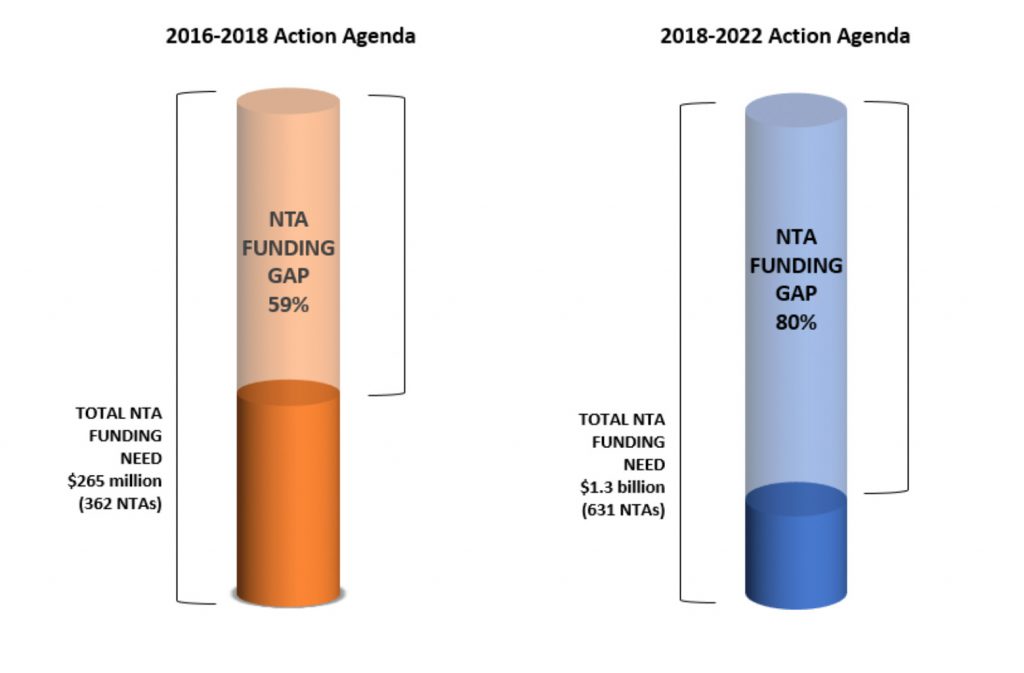Status of the Puget Sound Recovery Effort
Newly restored, Smith Island’s historic tidal marshlands provide critical habitat for threatened Chinook salmon. Photo Credit: Jon Bridgman
A new Action Agenda updates recovery efforts
The Action Agenda—the Puget Sound Partnership’s regional plan for protecting and recovering Puget Sound—complements and incorporates the work of many partners from around the region to describe strategies and specific actions needed to recover Puget Sound.
In December 2018, the Partnership’s Leadership Council approved the 2018-2022 Action Agenda. The 2018-2022 Action Agenda proposes over 600 priority Near Term Actions (NTAs) for implementation over the next 4 years and recognizes over 200 existing ongoing programs as the foundation for recovery efforts. In the 2017-19 biennium, state agencies alone budgeted an estimated $835 million for Puget Sound ongoing programs inventoried in the Action Agenda.
Reporting information, from the 2016-2018 and 2018-2022 Action Agendas shows that most Near Term Actions have not yet been implemented, primarily due to a shortfall in funding. Despite this continued funding gap, there are still many examples of successful actions funded by a variety of state, federal, local, tribal, and non-governmental sources. See three stories of Puget Sound recovery, highlighting implemented Near Term Actions from the 2016-2018 Action Agenda.

For more information about 2016-2018 Action Agenda Near Term Actions see the Action Agenda Report Card. See the Action Agenda Tracker for more details about 2018-2022 Action Agenda actions.
Updated Implementation Strategies
Recovery partners from across the Sound are developing a series of Implementation Strategies, or recovery plans. These plans are intended to inform Action Agenda priorities and accelerate progress toward the 2020 Vital Sign indicator recovery targets. Most recently, Implementation Strategies have been developed to address reducing toxics in fish, improving stream health and freshwater quality, and reducing the human contribution of depleted oxygen in marine waters.
Local Integrating Organization formed in the Puyallup-White River watershed
Local Integrating Organizations (LIOs) are local forums that meet regularly throughout the year to collaboratively work to develop, coordinate, and implement strategies and actions that contribute to the protection and recovery of the local ecosystem. The formation of a tenth Local Integrating Organization was recently announced to better promote ecosystem recovery in the Puyallup-White River watershed.
Puget Sound Recovery Efforts: Legislative highlights
The Puget Sound Partnership tracks and supports legislation that benefits Puget Sound recovery. The legislature passed four policy bills requested by Governor Inslee to implement the recommendations of the Governor’s Southern Resident Orca Task Force. The four bills will do the following:
- increase abundance of Chinook salmon and other prey critical to the Southern Resident orcas, 2SHB 1579
- reduce vessel noise and disturbance of orcas, 2SSB 5577
- prevent toxic pollution, SSB 5135
- improve oil transportation safety, ESHB 1578
The 2019-21 state biennial budget also included $49.5 million for the Puget Sound Acquisition and Restoration (PSAR) program—the second largest appropriation since inception of the program in 2007. These funds provide $30 million to continue the basic support of watershed priorities throughout Puget Sound. The remaining $19.5 million is distributed to three regionally significant large capital projects: the Middle Fork Nooksack Fish Passage Project, the Dungeness River Floodplain Restoration, and the Riverbend Floodplain Restoration on the Cedar River.
Partnership boards lead the way
Puget Sound Partnership’s boards periodically convene partners with the goal of reaching consensus about the most important work the region needs to do to implement the Action Agenda. Some recent progress made by the boards include the Leadership Council’s June 2019 forum on Chinook salmon and the Skagit River Total Maximum Daily Load (TMDL), and the Ecosystem Coordination Board’s recommendations in support of the need to sustain funding for “Shore Friendly” incentive programs. See more about these efforts, messages from the Puget Sound Partnership Leadership Council and Science Panel, and all the information contained on this page, in the 2019 State of the Sound Report.

